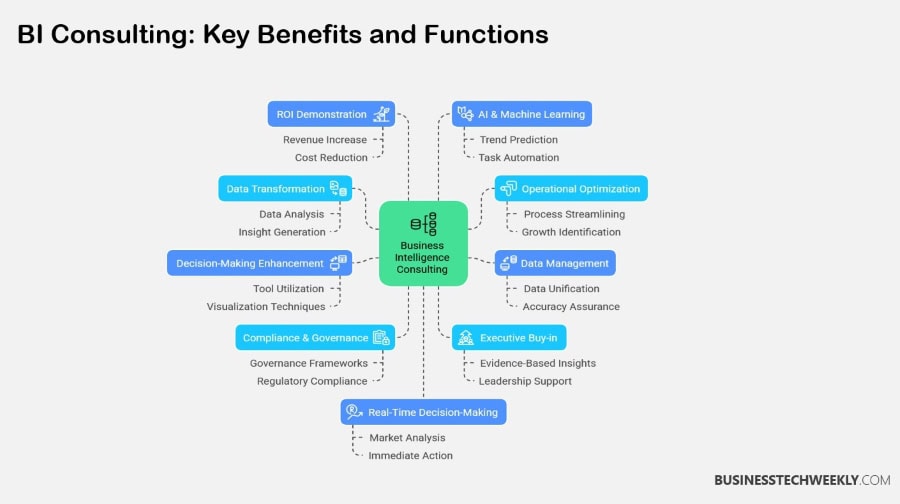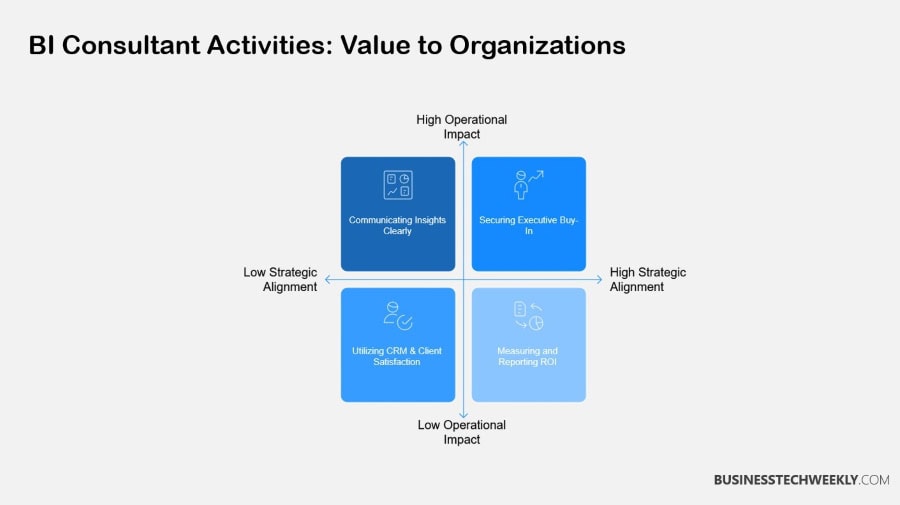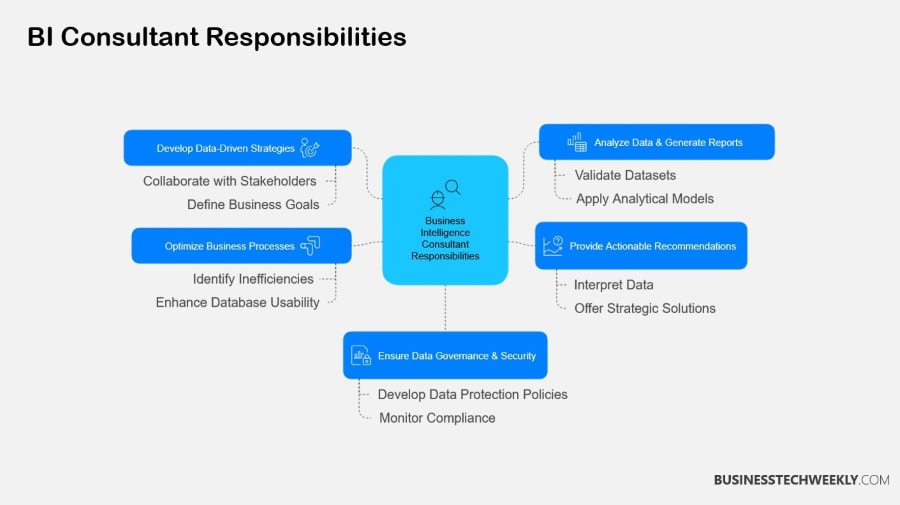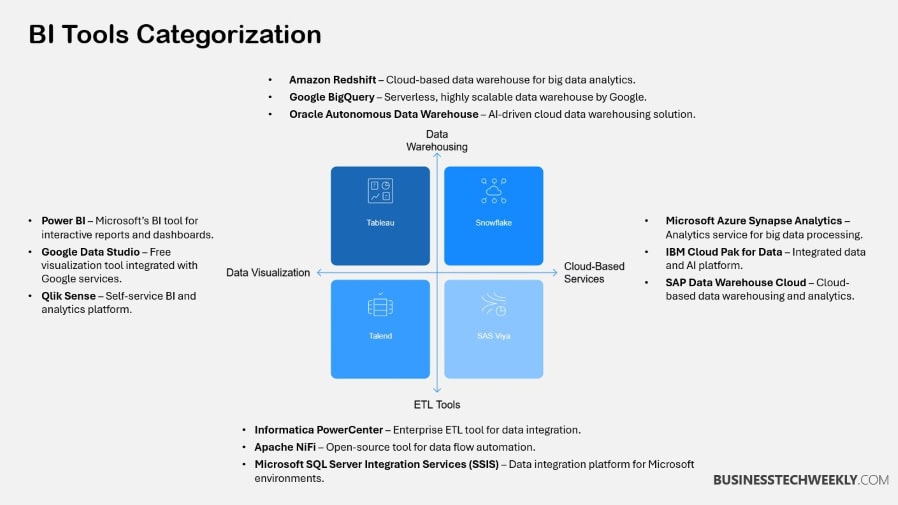Business Intelligence Consultant: Role, Skills & What to look for

On this page:
- What is BI Consulting?
- Why Businesses Need Business Intelligence Consultants
- Business Intelligence Consultant Responsibilities
- Essential BI Platforms and Tools
- How to Become a BI Consultant
- Essential Skills for a Business Intelligence (BI) Consultant
- Integrating Data Systems Effectively
- Demonstrating Value to Stakeholders
- Salary Expectations for Business Intelligence Consultants
- Key Points to Consider
- Frequently Asked Questions
What is BI Consulting?
Business intelligence (BI) consulting is a powerful service that equips organizations to wield data with an expert’s touch. Every day that businesses are open they produce huge quantities of new data.
BI consulting provides the guidance to dig deep, uncover trends and patterns, and convert that raw data into intelligent insights. By harmonizing data-driven strategies with overarching business objectives, BI Consulting’s services equip organizations to make informed business decisions and foster sustainable growth.
Understanding Business Intelligence Consulting
Like many today, we are inundated with data. This is where BI consulting steps in to make sense of large, complicated datasets and turn that data into actionable insights.
BI consultants deliver disciplined analyses that sharpen decision-making and reveal new directions for growth. Read more about how e-commerce companies are leveraging BI to improve pricing strategies, predict customer behavior, and more.
These services further allow for businesses to stay ahead of the competition by recognizing market trends and streamlining existing operations. Most importantly, BI initiatives are grounded in larger organizational goals and priorities, helping ready any technology investment to generate returns that matter.

The Business Intelligence Consultant’s Role
Dedicated BI consultants work hand in hand with each business to determine the most impactful goals of the project, adapting methodologies to fit unique needs.
They run complex data analysis to identify key trends, distilling their findings into easy-to-understand visualizations using programs including Power BI and Tableau.
Beyond just reporting, these consultants provide strategic direction, such as improving supply chain logistics or optimizing their marketing efforts.
They improve compliance risk through enhanced governance practices, safeguarding the integrity and security of data.
As a use case, consider a healthcare tech startup leveraging cloud services that require the protection of sensitive health information as they expand their reach and grow operations.
Highlight Consulting Value
|
Tool |
Features |
Pricing |
|---|---|---|
|
Tableau |
Interactive dashboards |
$70/user/month |
|
Power BI |
Real-time analytics |
$10/user/month |
Why Businesses Need Business Intelligence Consultants
Business intelligence consultants transform your data into a compelling narrative that reveals crucial business insights.
They empower organizations to uncover valuable insights, optimize operations, and seize new opportunities.
As data continues to grow exponentially, business intelligence consulting services have become indispensable for ensuring compliance and maintaining a competitive edge in a rapidly evolving marketplace.
1. Address Data Overload Challenges
As companies struggle to keep up with massive amounts of data, having the right systems becomes imperative, yet many businesses are caught unprepared.
BI consultants make this process much easier by unifying data across all platforms and providing a single point of access.
Combine your data with robust tools such as Tableau or Power BI that can take your analytics to the next level.
Prevent formatting issues to avoid confusing omissions. Avoiding data silos is just as important a factor in this process, as even small inaccuracies can skew decision-making in misleading directions.
Governance frameworks, developed by BI consultants, protect sensitive data from misuse. By helping with compliance regulations such as GDPR and CCPA, they create a trusted environment in the organization.
2. Improve Decision-Making Processes
Articulating those findings openly and transparently are essential to good decision-making.
BI consultants are remarkable at visually communicating data, employing dashboards that make complicated metrics clear and concise to stakeholders.
By formulating compelling, evidence-based cases, they obtain the necessary support from executives and stakeholders for pivotal initiatives. Measuring ROI on BI initiatives helps to make the case for their value.
Most importantly, it showcases tangible outcomes—like boosted revenue and reduced expenses—that support continued commitments to BI.
3. Gain Competitive Advantages
BI consultants utilize AI and machine learning tools to improve predictive analytics. This provides businesses with the ability to forward-looking trends and automate repetitive tasks more efficiently.
With real-time analytics, companies can immediately react to changes in the market.
At the same time, forecasting tools allow businesses to confidently strategize around long-term goals, providing them with a unique advantage.

Business Intelligence Consultant Responsibilities
Business Intelligence (BI) consultants play a crucial role in assisting businesses with business intelligence consulting services to leverage data for informed decision-making, enhance operations, and secure a competitive advantage.
Their expertise lies at the intersection of strategy, analysis, and technology, transforming raw data into valuable insights.
1. Develop Project Strategies
BI consultants work hand-in-hand with stakeholders to establish use cases, determine key performance indicators (KPIs), and develop measurable goals.
They design tailored strategies to align data initiatives with business priorities, ensuring tools and technologies, such as SaaS platforms or cloud-based solutions, meet specific needs.
For instance, in the world of e-commerce, this could mean predicting consumer behavior to increase sales conversions or optimize stock and supply chain movements.
2. Analyze Data and Report Findings
Analyzing complex datasets is central to a BI consultant’s role. They validate collected data, ensure accuracy, and create models to track behaviors in critical areas like customer retention or supply chain efficiency.
They keep an eye on significant metrics and develop methodologies such as ETL (Extract, Transform, Load).
Because of this, they produce descriptive reports that show trends, risks and opportunities. These insights give companies the ability to fine-tune their strategies to great effect.
3. Offer Strategic Recommendations
BI consultants don’t just analyze data. They analyze and interpret data to provide actionable, growth-oriented recommendations.
For instance, they might suggest refining SEO strategies to drive web traffic or adopting AI tools for personalized customer experiences.
Their knowledge enables them to directly inform their scaling efforts in highly competitive markets.
4. Optimize Business Processes
Streamlining processes is a second key responsibility. BI consultants document existing workflows, help to develop robust data policies, and point out inefficiencies.
To do this, they collaborate with IT teams to develop software solutions that enhance database usability and increase operational efficiency.
5. Ensure Data Governance and Security
First, protecting the integrity of the data is absolutely essential and non-negotiable.
BI consultants create and enforce governance protocols, monitor and maintain storage systems, and make certain that organizations comply with emerging regulations.
This protects personally identifiable information, building public trust and sustainability.

Essential BI Platforms and Tools
The business intelligence (BI) market has seen tremendous growth, with estimates predicting the market’s worth to grow to $61.86 billion by 2029.
For entrepreneurs and SMEs, leveraging the right business intelligence consulting services is a critical step toward navigating complex business landscapes, driving growth, and staying competitive.
Data Visualization Software
Data visualization transforms raw numbers into actionable insights through clear, interactive visuals.
Probably Tableau and Power BI – they’re great at building fancy dashboards that look clean and easy to use. These solutions enable you to measure success through meaningful KPIs and trending.
Looker stands out by using LookML, a proprietary modeling language, to build custom business rules, ensuring your data aligns with unique organizational needs.
These tools go a step further to streamline collaboration among multiple stakeholders by putting data in an accessible and actionable format for both decision-makers and the public.
ETL Tools
ETL (Extract, Transform, Load) tools are essential for companies working with data from multiple sources.
Solution Platforms like Talend and Informatica simplify data integration, letting organizations focus on deriving insights faster and more effectively from their data.
By automating data workflows, ETL tools ensure that your analytics are based on accurate, up-to-date information, enabling quick responses to market changes.
Data Warehousing Solutions
Immediate centralized data storage and distribution is key to future system performance, scalability, maintenance, and security. Solutions such as Snowflake and Amazon Redshift not only make data easily accessible across your organization, but they fully support advanced analytics.
With strong data warehousing paired with user-friendly reporting, IBM Cognos shines in hybrid cloud environments. Its powerful combo is why it’s a trusted choice for enterprises like yours.
Cloud-Based BI Services
Cloud-based business intelligence consulting services, such as SAS Viya and Sisense, provide versatility and scalability essential for startups and small-scale medium enterprises.
SAS Viya’s AI-driven analytics process high volumes of business data efficiently, while Sisense integrates BI directly into daily operations, ensuring valuable insights are actionable.
How to Become a BI Consultant
Being a Business Intelligence (BI) consultant requires a blend of trade skills, industry knowledge, and business acumen.
As organizations increasingly rely on business intelligence consulting services to drive decisions, the demand for skilled BI consultants is skyrocketing.
Educational Background
A bachelor’s degree in areas such as computer science, information systems or business analytics provides a strong foundation. Courses in statistics, data management, and SQL are especially useful.
For those looking to broaden their opportunities, pursuing a master’s or doctorate in BI or related areas can provide a competitive edge.
Required Work Experience
Hands-on experience is key. A lot of them begin in positions such as data analyst or database administrator to develop a good basis.
This experience builds proficiency in ERP applications, including data mining techniques and the specific challenges faced within the industry.
Experience in sectors like e-commerce or SaaS can position you to better understand unique BI requirements and craft tailored solutions.
Key Skills to Develop
Technical proficiency in tools like Tableau, Microsoft Power BI, and QlikView is crucial to develop dynamic data visualizations that tell persuasive stories.
A strong grasp of data warehousing, SQL, and statistics is an absolute must. Soft skills such as communication and business acumen are just as critical.
They free you to focus on translating sophisticated database-driven insights to actionable strategies for clients.
Certifications to Obtain
Certifications such as Tableau Desktop Specialist, Microsoft Power BI Data Analyst, and Certified Business Intelligence Professional (CBIP) help to prove your proficiency.
They serve to tremendously increase your credibility within the field. These certifications are a great way to show your commitment to the field and can have a big impact on your earning potential.
Essential Skills for a Business Intelligence (BI) Consultant
Business Intelligence (BI) consultants play a critical role in helping organizations harness data to drive strategic decisions.
Their responsibilities span across data collection, analysis, visualization, and interpretation to uncover insights that improve business performance.
To be successful in this field, BI consultants need a combination of technical expertise, analytical thinking, project management abilities, and strong communication skills.
Skill Category |
Specific Skills |
Description |
| Technical Skills | SQL & Database Management | Ability to query and manage relational databases (SQL, MySQL, PostgreSQL). |
| BI Tools & Platforms | Proficiency in tools like Power BI, Tableau, Looker, QlikView, or SAP BI. | |
| Data Warehousing | Experience with data modeling, ETL processes, and tools like Snowflake, Redshift, or Azure Synapse. | |
| Programming | Knowledge of Python, R, or JavaScript for data manipulation and automation. | |
| Cloud Computing | Familiarity with AWS, Azure, or Google Cloud for cloud-based BI solutions. | |
| Data Integration | Experience with APIs, data pipelines, and middleware solutions. | |
| Analytical Skills | Data Analysis | Ability to interpret data, identify trends, and generate actionable insights. |
| Statistical Analysis | Understanding of statistical methods, predictive analytics, and data forecasting. | |
| Business Acumen | Knowledge of business processes, KPIs, and industry-specific analytics. | |
| Data Visualization | Capability to create compelling and insightful dashboards/reports. | |
| Project Management | Agile & Scrum | Experience working in Agile/Scrum environments for BI projects. |
| Stakeholder Management | Effective communication with executives, analysts, and developers. | |
| Requirements Gathering | Ability to translate business needs into technical BI solutions. | |
| Change Management | Managing BI adoption and training for end-users. | |
| Soft Skills | Communication | Ability to explain complex data concepts to non-technical stakeholders. |
| Problem-Solving | Critical thinking and troubleshooting skills for BI challenges. | |
| Collaboration | Teamwork with IT, finance, marketing, and other business units. | |
| Adaptability | Ability to stay updated with evolving BI technologies and trends. |
Integrating Data Systems Effectively
Seamless data integration should be at the heart of any enterprise business intelligence consulting strategy.
By connecting disparate data systems, businesses can unlock valuable insights, streamline operations, and make decisions based on a unified view of their business data.
Best Practices for Data Integration
Successful data integration starts with choosing the best method that aligns with your organizational goals.
Real-time integration, powered by technologies like Change Data Capture (CDC) or event-driven architectures, ensures timely access to critical information for responsive decision-making.
For example, e-commerce businesses can utilize CDC to monitor real-time inventory information, avoiding stock shortages and ensuring the most efficient order fulfillment process.
Batch updates work well for more back-end, non-time-sensitive processes such as generating a monthly sales report.
Cloud-based solutions take flexibility a step further, providing an added level of scalability to address increasing data volumes while maintaining optimal performance and cost-efficiency.
Ensuring Data Quality and Accuracy
Data quality plays a huge role in the accuracy of BI findings. Using strong validation, cleansing, and enrichment processes helps make sure your data is as accurate and complete as possible.
Tools such as DCKAP Integrator reduce data silos allowing organizations to have a holistic and enriched view of their data.
For instance, boosting customer profiles with behavioral intelligence can improve targeting and segmentation, leading to higher conversion rates.
With reliable data, companies can make smart moves to enter and compete confidently in new markets.
Managing Data Governance
Data governance supports integration efforts by ensuring the integrity and compliance of data. Establishing policies early on that outline plans for ownership, access, and utilization of data protects sensitive information and follows legal requirements.
Such iterative governance strategies informed by and responsive to changing business direction will keep your BI systems healthy, living, and breathing.
Clearly articulated governance framework turns data into a strategic asset, creating trust and accountability.

Demonstrating Value to Stakeholders
Business intelligence consultants play a crucial role in connecting the dots between business data and strategies that enhance performance management.
Clear communication and measurable outcomes are vital for demonstrating value to stakeholders and aligning with business needs.
Communicating Insights Clearly
Effective communication distills technical information into digestible formats, enabling action based on business intelligence insights.
Visualizing the data through interactive dashboards or reports allows stakeholders to grasp important trends and metrics at a glance.
This approach enhances the effectiveness of business intelligence consulting services by making complex data more accessible.
Showcasing client satisfaction as a primary KPI not only demonstrates your commitment to their goals but also builds trust, paving the way for long-lasting relationships.
Utilizing CRM tools to track client interactions improves transparency and accountability, alleviating concerns and reinforcing your business intelligence consulting experience.
Providing tailored training programs equips teams to maximize BI software, fostering informed decision-making across the organization.
This strategic consulting approach promotes the effective use of business analytics methods, ensuring that all employees can leverage valuable insights for better business outcomes.
Securing Executive Buy-In
To gain executive support, BI initiatives must be clearly aligned with organizational goals and priorities. Aim to show how your findings can specifically help drive revenue growth, the KPI of all KPIs and the key to business survival.
Citing concrete use cases, such as using people analytics to improve workforce planning, stresses the practical value BI tools deliver.
As organizations invest, talent development in this function increases and stakeholders begin to prioritize BI adoption. They get that operational efficiency and profitability value proposition.
Frame your recommendations as strategic enablers, helping to make sure executives understand the long-term return on their investment.
Measuring and Reporting ROI
Demonstrating ROI in this case would mean measuring outcomes directly attributed to BI tactics.
For example, measurements of top-line growth or efficiency improvements directly link your contributions to quantifiable business success.
Reporting these metrics on a regular basis, in addition to progress made on developing new training or utilizing new tools, establishes your value as a consultant
Salary Expectations for Business Intelligence Consultants
Understanding the salary landscape for Business Intelligence (BI) consultants is essential when navigating career decisions or hiring within this field.
Compensation varies significantly depending on industry, level of experience, and the reputation of the business intelligence consulting firm.
This opens the door to a myriad of unique opportunities for experienced professionals in this role.
Factors Influencing Salary
It’s important to note that multiple factors influence the income of BI consultants. The role the industry plays can’t be understated when it comes to salaries.
Telecommunications continues to be the highest-paying industry, with a median overall compensation of $147,195 per year.
Management and Consulting tops the chart with an impressive median pay of $138,892.
By comparison, sectors including Insurance and Healthcare offer median salaries of $117,492 and $111,871, respectively. The firm you work with matters a lot on how much money you are going to make.
Within the Information Technology sector, the highest pay firms include UKG, IBM, and Teradata. The story is quite different when it comes to our biggest leader in Human Resources and Staffing—Collaborate Solutions.
Geography and demand play a big role in salaries. Areas with many technology companies or consulting centers typically experience higher than average salaries.
Consequently, the demand for BI expertise is through the roof. This trend drives competitive wage scales in the private sector as well.
Salary Ranges by Experience Level
Newly minted entry-level BI consultants can expect salaries ranging from $87,000 up to $120,000 per year.
In comparison, the wage for the mid-level worker is $116,000 to $169,000. Senior consultants or consultants with specialized industry or technical expertise can fetch $170,000 to $245,000.
With added pay like bonuses typical at $18,833 a year, total compensation easily can exceed $127,000 a year.
The median total compensation in Information Technology is $116,667. This is indicative of the huge demand for BI skills within the sector.
Source |
Average Salary |
Salary Range |
Notes |
| Glassdoor | $139,866/year | Not specified | Based on 377 salaries submitted by BI Consultants. |
| Talent.com | $102,500/year | $80,000 – $141,409 | Entry-level positions start at $80,000, with experienced consultants earning up to $141,409. |
| ZipRecruiter | $113,566/year | $96,000 – $131,500 | 25th percentile at $96,000; 75th percentile at $131,500. |
| PayScale | $91,788/year | $66,000 – $135,000 | Data based on 286 salary profiles. |
Key Points to Consider
- Business intelligence (BI) consulting helps wide-ranging organizations turn unlimited data into actionable visual insights. It empowers them to confidently decide and drive intelligent growth with experienced analysis and measurable insights.
- BI consultants assist with creating project strategies and interpreting the story behind the data trends. They produce data-informed recommendations to improve overall business performance and operational effectiveness.
- Taking advantage of BI consulting services provides businesses with a distinct competitive advantage. They can utilize predictive analytics, real-time insights, and innovation technologies such as AI and machine learning.
- Effective BI consulting aligns technology with business goals, ensuring that data analytics initiatives support organizational objectives and deliver measurable ROI.
- Basic BI technologies, including data visualization programs and ETL technology, seriously improve data quality and integration. Building on this, cloud-based services increase accessibility, empowering everyone to deliver their best work.
- Becoming a BI consultant requires a strong educational foundation, relevant work experience, technical skills, and certifications to build credibility and expertise in the field.
Frequently Asked Questions
What does a business intelligence (BI) consultant do?
Business intelligence consultants play a crucial role in helping organizations understand their data and implement effective BI solutions.
By leveraging business analytics methods, they develop strategies that enable companies to utilize business data for informed decisions.
These professionals create compelling dashboards and streamline data systems, ensuring stakeholders receive actionable insights to enhance operations and meet objectives.
Why should businesses hire a BI consultant?
Business intelligence consultants work with private and public businesses alike to transform raw data into valuable insights.
By leveraging business intelligence consulting services, they streamline decision-making, eliminate inefficiencies, and ascertain new prospects for growth.
Hiring a consultant not only saves your staff time but also provides expert guidance on using BI software most effectively.
What skills are essential for a BI consultant?
Key technical skills for a successful business intelligence consultant include data analysis, SQL, and experience with BI tools such as Tableau or Power BI.
Excellent communication skills, alongside a deep knowledge of business processes, are crucial for effective business intelligence consulting.
What are the top BI tools BI consultants use?
The most commonly adopted BI tools, such as Tableau, Power BI, QlikView, and Looker, are essential for business intelligence consulting services, enabling users to build interactive dashboards and visualize their business data for more accurate decision-making.
How much do BI consultants typically earn?
In the U.S., the annual salary range for a business intelligence consultant is from $75,000 to $120,000, though this varies by experience, certifications, and geographical location.
Senior consultants and those with specialized knowledge in business intelligence consulting can earn significantly more.
How can someone become a BI consultant?
Begin by obtaining a degree in data analytics, business, or IT.
Build up your experience in data analysis and BI tools. Certifications on Tableau, Power BI, or SQL are very helpful. Networking and continuous learning go hand-in-hand to fuel success.
What are the emerging trends in business intelligence?
These trends encompass the use of AI and machine learning for advanced, automated analytics, real-time data processing, and predictive analytics.
Business intelligence consulting services, along with cloud-based BI solutions and self-service BI tools, are on the rise, empowering organizations of all sizes to access, visualize, and act on business data more intuitively.

